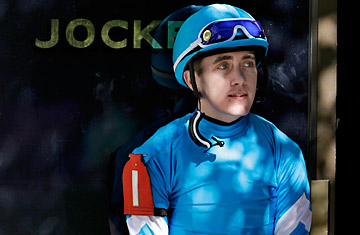
Jockey Michael Baze waits to ride in the seventh race at Keeneland Race Course in Lexington, Ky., Oct. 8, 2010. Baze was pronounced dead at 4:47 p.m. EDT on Tuesday May 10, 2011 in his vehicle parked in the stable area at Churchill Downs, just days after the Kentucky Derby.
(2 of 3)
The riders also suffer from their itinerant business model. They are all essentially independent contractors — transient workers. Bob Fletcher of the Winners Foundation, a California-based group that provides counseling to the state's tracks, says, "It makes it hard for those of us who want to offer help. They're constantly on the go, traveling from track to track. They work six or seven days a week — up at 4 a.m., and their work ends at 10 or 11 and they come back in the afternoon. They're away from their families. They struggle to make weight. Yet they still need some sort of business acumen to entertain owners and trainers and keep their business running. It's a difficult job."
For a 24-year-old in slump, Michael Baze had already had a significant career. He won 918 times out of 6,969 mounts, earning $32.4 million for the owners of the Thoroughbreds he raced. In 2011 alone, before he died, he won 34 times, ranking him 59th among 1,209 jockeys nationwide.
Faced with a slowdown in his California races, Baze set off for the midwest, thinking success there would be a springboard into the legendary Churchill Downs. It seemed to be working. Baze won the 2010 summer meet at Chicago's Arlington Park and finished fourth this past winter at Oaklawn Park in Arkansas. In April, he road Nehro to a second-place victory in the Louisiana Derby. (The horse would eventually come in second in the Kentucky Derby.)
But there were signs of trouble. Baze already had a DUI arrest in California. His former agent Ronnie Ebanks speculates that Baze may have let his regimen slip in Chicago. He had separated from his wife Kelly when he moved and, says Ebanks, without a support structure, he may have become too enamored with nightlife "instead of going home to eat dinner and go to bed early." Last fall, Louisville police had arrested him for possessing a small amount of cocaine, the charge he was scheduled to face in court in May. In March, he was taken off his mounts at Oaklawn and fined $500 after failing a Breathalyzer test. He sought counseling in Arkansas, where he was on medication for depression and a lifelong sleep disorder. His mother, Teri Gibson, visited him there. "He was a hard one to get to because he didn't ever want to bother anyone else with what was going on with him," she told TIME. "He was always concerned about everyone else." But, she says, "He began to open up in counseling. He would talk about the pressure. People used to tell him 'You can be the greatest. You're better than Shoe.'" She says, "He never felt that confident."
Could he have been saved? Kentucky's new racing license requires information about previous arrests. If that data had been on Baze's form, it would have come to the attention of the state horse racing commission. But Baze's application apparently fell through the cracks. He filled in and turned in an older form that asked only about convictions. Baze had none. The information would not necessarily have prevented him from riding. A number of jockeys who have been treated for substance abuse have been granted conditional licenses and resumed successful riding careers, says Marck Guilfoil, deputy executive director of the Kentucky Horse Racing Commission.
